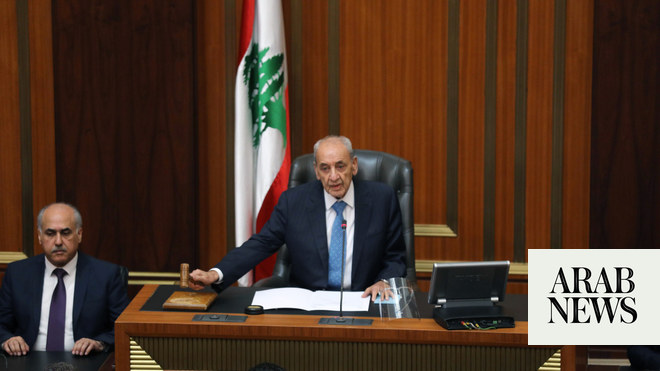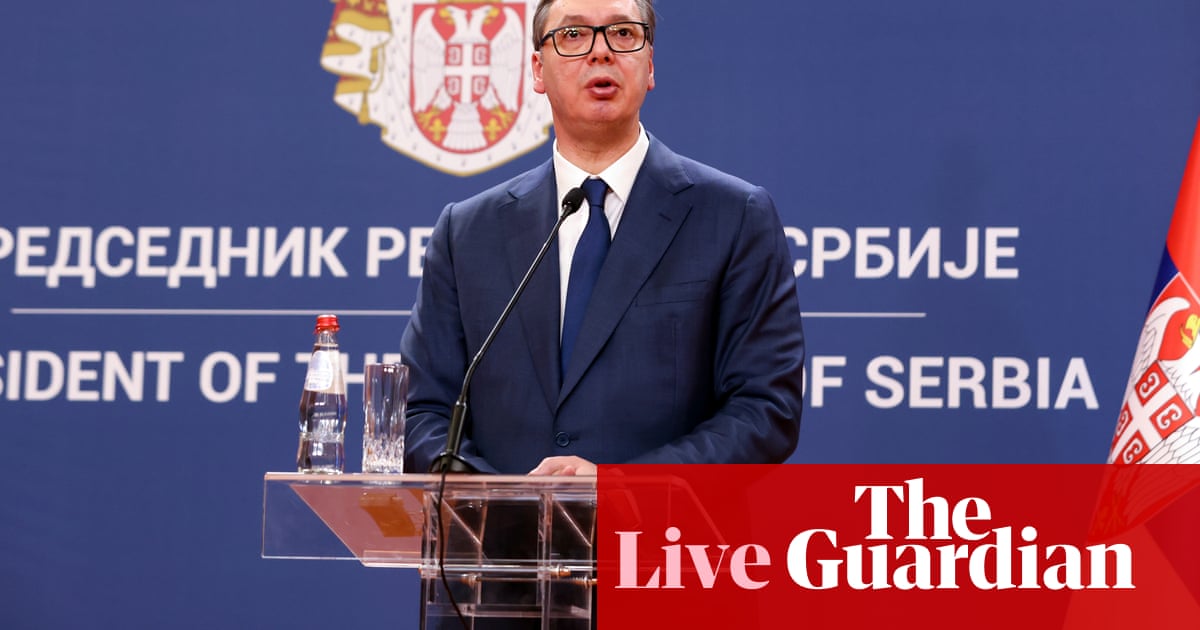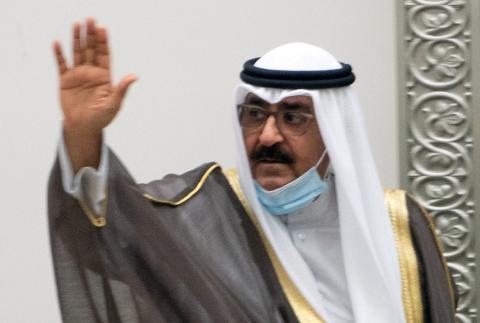
Nabih Berri’s announcement comes amid growing fears of vote walkout
BEIRUT: Parliament Speaker Nabih Berri has set June 14 as the date for holding a session to elect a Lebanese president.
Former President Michel Aoun’s term expired last October with no successor lined up.
Monday’s announcement came after Lebanon’s disparate opposition, independent and main Christian parties said on Sunday that they had nominated IMF official Jihad Azour for the presidency in a challenge to Hezbollah-backed candidate Suleiman Frangieh.
Hezbollah and its allies insist on nominating Frangieh, head of the Marada Movement, for the position, with political divisions mounting amid debate over the necessary qualities of the next president.
Berri had stopped scheduling sessions since January after 11 sessions failed to elect a president.
Azour, director of the Middle East and Central Asia department at the IMF, has yet to officially announce his candidacy for the presidency.
However, he has however held a series of meetings with opposition MPs, during which he answered their questions and concerns.
There was anticipation on Monday for the outcome of the next presidential election session.
But leaked reports claimed that Hezbollah Secretary-General Hassan Nasrallah informed the envoy of Maronite Patriarch Bechara Boutros Al-Rahi during their meeting on Sunday that the party insisted on its support for Frangieh.
The opposition forces are looking forward to the position of the Progressive Socialist Party bloc.
It is scheduled to hold a session this week to determine the direction of its vote in the upcoming election session.
MP Hadi Abu Al-Hassan of the Progressive Socialist Party expressed his surprise at the concern shown by Hezbollah and the Amal Movement over Azour.
The MP said that Azour is “a patriotic person who does not stab a Lebanese partner.”
He added: “Also, our system is not presidential, and the president does not make decisions in isolation from parliament and the Cabinet.
“Any agreement with the IMF is done through the parliament and the government,” he said, adding that Azour “is not a challenge candidate, and we proposed his name five months ago.”
The MP said that opposition forces have agreed with the Free Patriotic Movement to nominate Azour.
“Our nomination (of Azour) was not a maneuver, but a serious proposal that we have not changed our mind about. However, the issue now is not about nomination or voting, but about how to prepare the atmosphere for Azour to reach the presidency,” Abu Al-Hassan said.
“The sharp alignment may create a kind of polarization that can be interpreted as a challenge nomination.”
The MP suggested “expanding the range of support for Azour and not going to sessions that resemble previous ones, in order to come out with a president who can ensure broad consensus.”
He said: “We need a quorum of 86 for a candidate to win in the first round, and a quorum of 65 for a candidate to win in the second round. In the absence of consensus, there are two obstacles that stand in the way of Azour’s path to the presidency.
“The first is denying the quorum in the second session, and the second is sectarianism, meaning the Shiite MPs in the parliament refrain from electing him.”
MP Bilal Abdullah, a member of the Democratic Gathering, said: “Electing a president in the absence of Shiite-Christian consensus is impossible.
“Filling the presidential vacancy requires providing a quorum of 86 MPs to attend the second round and 65 to win, and no one is able to secure them.”
MP Kassem Hashem, from the Amal Movement bloc, played down the importance of the opposition agreeing to nominate Azour.
He said: “What is happening is aimed at preventing Frangieh from reaching the presidency.”
Independent MP Abdulrahman Bizri said that he and MPs Osama Saad, Charbel Nahas and several Change MPs were still studying the situation in order to make the right choice.
He added: “We do not want a battle between a candidate supported by Hezbollah and the Amal Movement, the Shiite duo, against a candidate supported by the Christian majority.”
One political observer expressed fears that some opposition forces had only named Azour to confront and overthrow Frangieh — the candidate of the Shiite parties — only to replace him with a more suitable consensus candidate.
In a joint statement, the Lady of the Mountain gathering and the National Council to End the Iranian Occupation of Lebanon said that they rejected Hezbollah’s “attempt to force a president on the Lebanese people, violating the Lebanese constitution, as well as the political and sectarian diversity in the country.”
The joint statement added: “Since there are two candidates for the presidency, there is no longer any political excuse for the speaker not to hold a session for continuous rounds to elect the president.
“Whoever obstructs the quorum should bear full responsibility for the continuation of the presidential vacuum.”
The Lebanese constitution stipulates that sessions of the electoral body remain open until the president is elected.
The constitution also states that before the end of the term of the incumbent president — at least one month or at most two months — parliament shall meet at the invitation of its speaker to elect a new president.
“If parliament does not convene for this purpose, it shall meet by law on the 10th day preceding the end of the president’s term.
“The convened parliament to elect the president is considered an electoral body and not a legislative body, and it is required to immediately proceed to elect the president without discussing any other business.”
According to the constitution, the president negotiates and concludes international treaties in agreement with the prime minister, and they do not become effective until approved by the Cabinet.
Treaties that involve financial conditions related to the state and commercial treaties cannot be concluded without parliamentary approval.












